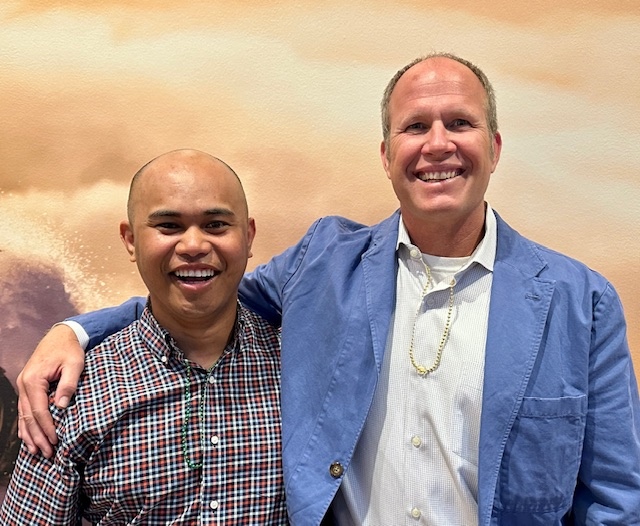
Esbei Arurang and Paul Barendregt at Celebrating Leadership in May 2024. Esbei Arurang
Amanda Dale • January 15, 2025
January is National Mentoring Month, and we’re celebrating by uplifting some of our favorite stories of mentorship from Forum programming. In this post we meet Esbei Arurang (Leadership Anchorage Cohort 27) and his Leadership Anchorage Mentor, Paul (Bear) Barendregt.

Esbei Arurang and Paul Barendregt at Celebrating Leadership in May 2024. Esbei Arurang
In the Forum’s Leadership Anchorage (LA) program, participants develop the skills, knowledge, perspective and networks needed to be effective and compassionate changemakers. As a part of that growth, each participant chooses a mentor to work with over nine months. LA alumni support the Forum in providing a list of possible mentors for each participant, based on what they have said they’re looking for.
Esbei Arurang, 31, an Education and Training Program Manager at the Alaska Air National Guard, knew what he was looking for in an LA mentor last year. “I was looking for an Air Force veteran who is involved in the Anchorage community,” he remembers. “Because I am unsure of what ‘retirement’ from the military is going to look like, I wanted to choose a mentor who both understood the transition out of the military and who was doing things I thought were exciting.” When he looked up Paul Barendregt, one of the program’s suggested mentors, he was struck by how much they had in common. “Paul retired as a chief [master sergeant] out of the Guard, [which] was really exciting to me.”
For Paul, who retired from the Guard in 2016, mentorship had long played a significant role in his life. “In the military you become a natural mentor, and for me that’s something I always loved,” he says. “I love helping people achieve their goals or at least being there to be a sounding board. When [AKHF] approached me about it, I was like sure yes, if you think I can be of use. It was one of the things I had missed about not being in the military.”
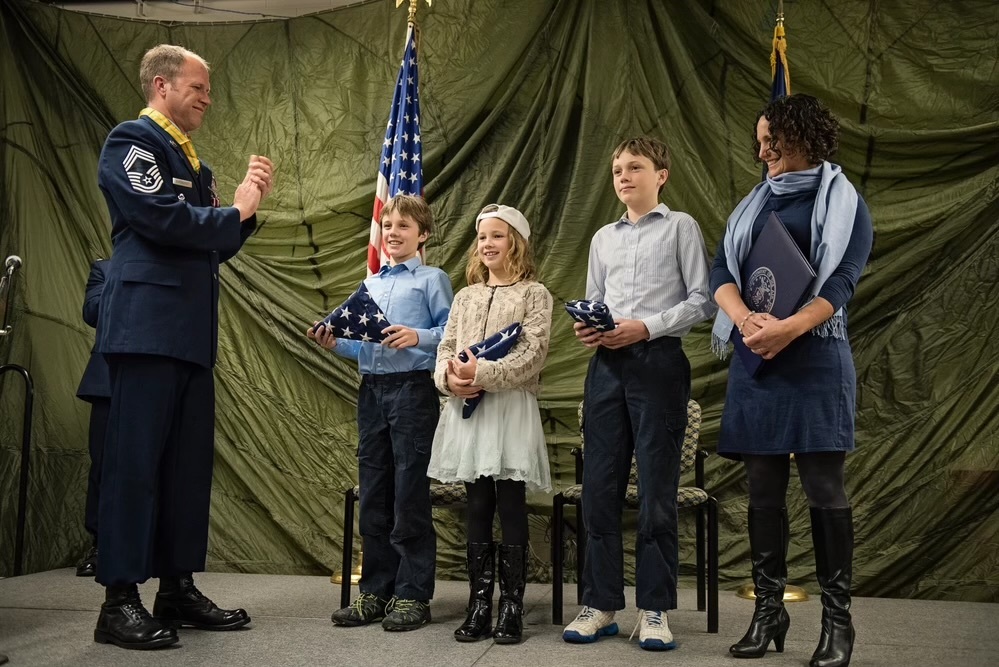
Paul Barendregt and his family at his retirement ceremony from the Alaska Air National Guard. Paul Barendregt
Leadership Anchorage gives broad guidance for the mentorship component, but the specific structure of each mentorship - when and where to meet, what to talk about - is decided by each pair. From the beginning, Arurang embraced this challenge. “This was natural for me,” he recalls. “I like structure, I can operate within it, but personally I also like variance and more critical thinking spaces. I know things in myself I need to work on, that are weaker, and I know what I’m good at. So I came [to the mentorship] with goals, but very broad ones. I knew that part of the goal was to figure out the purpose itself.”
Paul was initially surprised by Esbei’s thoughtfulness. “Esbei came very prepared - hi, this is what I’m thinking, this is what I’m looking at. And I thought, I don’t know if I have anything to offer this guy!” But the two soon found that they had a lot of connection points, including what drew them to join the military in the first place.
Paul joined the military at 17 looking for more opportunities. “My parents were immigrants so I was paying for everything, tough-minded, independent. I was going to go in for four years, go to college, and get out. But I found something that worked for me.” Esbei, who joined at 18, heard himself in Paul's story. “Truly the same,” he says. “I knew that at some point I wanted to go to school but I knew I couldn’t afford it and I didn’t want to ask my family to support me. It started with a 6-year enlistment and evolved from there.”
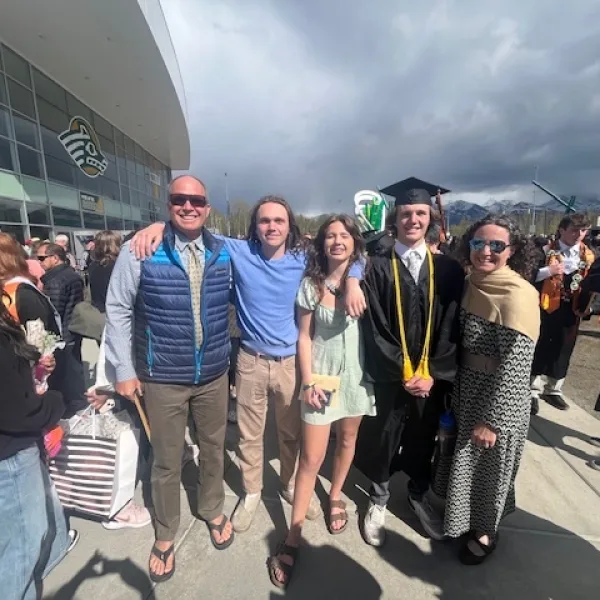
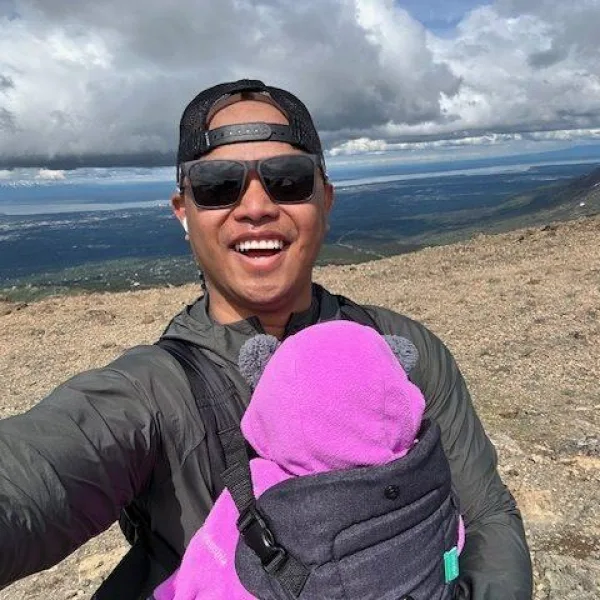
Paul, now 50, remembers clearly the phase of building a career, starting a family, and creating goals for the future that Arurang lives in now. “I know I had proximity growth and future growth happening all at the same time,” he says. “Esbei talks about near growth, like goals with his friends and family, and I am a distant goal kind of person for him. To use a military term there’s a 5-meter target and a 100-meter target, and I’m the 100-meter target.” This distant growth was top of mind for Arurang, who says he even wrote down a goal for the mentorship of talking about the possibility of running his own business or nonprofit. “Paul opened up the entire idea that I could, with enough planning, focus on the things I want to do myself,” he reflects. “It made me purposefully think about, what are the avenues I haven’t thought about before?”
“You can see a future track clearly in the military,” says Esbei. “The system is designed for people to progress in rank and that pushes people toward finding formal or informal mentors because you know these people have been successful in getting to where your career will hopefully get.” Life after leaving the military, by contrast, feels nebulous. “In the military the goal is to make yourself obsolete, but in the civilian sector it feels like you have to make yourself indispensable,” Paul explained. “I know what my next 10-15 years look like” says Esbei, “so I wanted somebody who could understand that. It’s such a different language. You want someone who can relate. And more down the line, thinking about transitions - I wanted someone who had the experience of retiring and staying in Anchorage.”
Paul is quick to recognize the people who have mentored him, formally and informally, during and after his military career. “I still have people I look up to,” he says. “When I was younger I asked, How did they get there? How did they do that? I had how-to-be-a-father mentors, how-to-be-a-good-husband mentors… it’s so important to be exposed to people at different stages in their lives.”
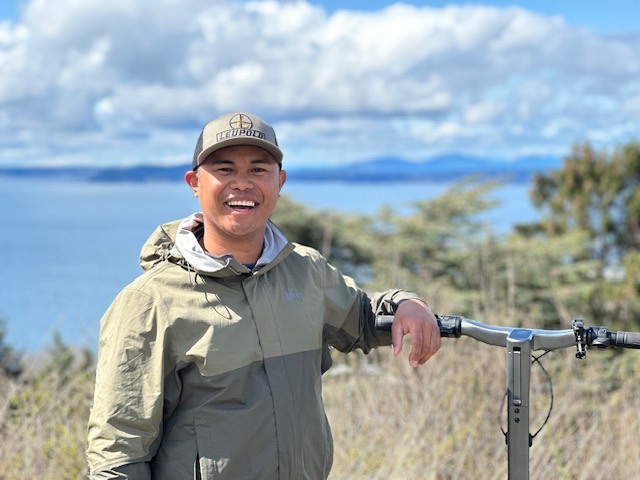
Esbei Arurang Esbei Arurang
Despite their shared understanding of the military context, the pair say they ultimately spent less than half of their time talking about it. “He’s not just in the military. I’m not just retired military,” says Paul. “It was more about the whole person,” agreed Esbei. “Fatherhood, retired life, how Paul navigated everything he was doing. We talked about having your own business.” While Paul sometimes worried about whether he was being a good mentor, Arurang had already made up his mind to succeed. “I looked at it as like, no matter what this relationship evolved into, there is no failing.” He then turned to Paul: “There’s no real way to fail. But you have been a great mentor.”
During the mentorship period, the pair met once a month in person, to go for walks. When Esbei’s daughter was born in spring 2024, it opened up a new level of connection. They talked about fatherhood and the baby came on some of the walks. “It was cool to be there through the process,” remembers Paul. “I felt like I was walking next to you during the journey, just seeing it. It was also a testament to the military evolving,” he says, recalling how he managed to work out 10 days of parental leave when his youngest child was born. By contrast, Esbei had 12 weeks of parental leave. “That’s progress,” says Paul.
Unique to Leadership Anchorage’s mentorship component is the emphasis on relationship-building so that participants can get comfortable enough to engage around real, hard questions, and be challenged in their thinking. “I think this is awesome because it’s so intentional,” Paul says. “[The networking is one] measure of success, but that’s the easiest part. You do this to grow a relationship. Leaders engage community members deliberately and intentionally, and being intentional about this mentorship says so much about who you are as a leader.”

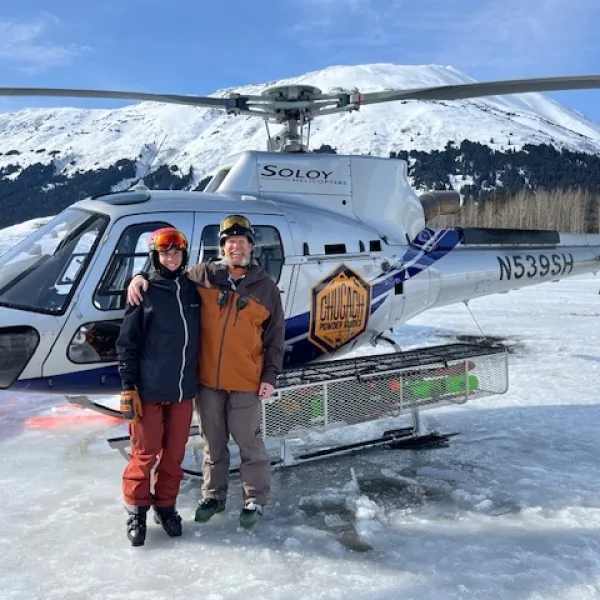
Next steps for Esbei include hopefully becoming a pilot - a goal he’s been working toward for four years. “It’s super selective,” says Paul proudly, of his mentee’s selection to begin training.
Paul also found that the mentorship inspired him to revisit his own goals for the future. “The biggest thing was to remember there’s still growth potential for myself,” he says. “I still need to be looking for mentors for myself. This was a gentle reminder to stay engaged in myself and my community and the people around me.”
“If people are intentional about [mentorship], this can be the most powerful, impactful part of the entire program,” says Esbei. “This was me figuring out the things I needed to figure out.” Says Paul: "It was all his doing!”
The Alaska Humanities Forum is a non-profit, non-partisan organization that designs and facilitates experiences to bridge distance and difference – programming that shares and preserves the stories of people and places across our vast state, and explores what it means to be Alaskan.
November 13, 2025 • MoHagani Magnetek & Polly Carr
November 12, 2025 • Becky Strub
November 10, 2025 • Jim LaBelle, Sr. & Amanda Dale